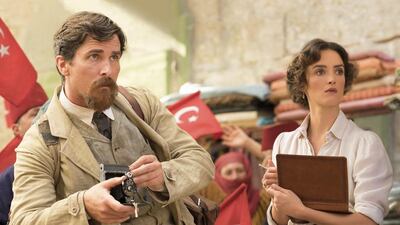BEIRUT // For generations, Armenians have been involved in an uphill battle for the international community to recognise the Ottoman Empire’s massacre of their descendants during the First World War as genocide.
Now, 102 years after the slaughter and death marches began, and with Turkey not only continuing in its denial of genocide, but also lobbying against it being labelled as such by other countries, recognition may have finally come from an unlikely place. Hollywood.
The Promise, which opens in UAE cinemas on Thursday, brings the story of the massacre to the big screen for the first time, portraying a love triangle between a hard-drinking but fearless American reporter (Christian Bale), a young Armenian medical student from the countryside (Oscar Isaac) and a cultured Armenian nanny (Charlotte Le Bon) at the outset of the killings.
The film has received mixed reviews from critics, with some panning it as cliched, and it tanked at the box office over its opening weekend in North America.
But that seems to matter little to cinema-goers in Lebanon, home to hundreds of thousands of Armenians whose ancestors fled here to escape the violence. Nor does it seem to matter that the characters lack depth or that the tale is told through a decidedly American lens, with a focus on the reporter character and English used throughout the film.
What does matter is that the massacre is portrayed as a genocide.
Released in Lebanon just before the annual April 24 commemoration of the massacre, screenings of The Promise have been packed.
Christ Kojamanian, 23, said he cried through two showings of the film during its opening weekend.
“It’s very good, it’s an excellent movie,” he said. “There is so much bad stuff about the Turks – but it’s all real.”
Mr Kojamanian said he hoped the film would raise awareness about the killings 100 years ago.
“We will keep fighting for the recognition of the genocide. We are waiting for America to do it – they are the king,” he added. The United States is among a majority of countries that do not recognise the killing of an estimated one and a half million Armenians as genocide.
Mr Kojamanian spoke to The National at a gathering of thousands of Armenians in downtown Beirut on Monday to commemorate the 102nd anniversary of the killings which are generally considered to have started in April 1915.
To Lebanese Armenians, the massacre is more than a painful historical event: It is the reason that most of them are here in Lebanon, hundreds of kilometres from their ancestral homeland, and represents a battle they are still fighting. Although the first Armenians to settle in Lebanon arrived in the fourth century as Christian pilgrims en route to Jerusalem, their numbers remained small until after 1915.
Mr Kojamanian is from Burj Hammoud, a suburb of northeastern Beirut. It used to be unwanted swampland before Armenians began arriving a century ago and eventually built the bustling neighbourhood it is today. Anti-Turkish graffiti covers the district’s streets and alleys year round. And as the anniversary of the First World War massacre approaches every April, banners are hung from shops and buildings calling for recognition, remembrance and justice.
A few miles north in the town of Antelias, a pile of skulls at a mausoleum serves as a reminder of what happened, while the arrival in Lebanon of Armenian refugees fleeing persecution in Iraq and Syria in recent years reminds communities that Armenian suffering is not yet over.
Sevag Shamlian, 47, was at Monday's gathering wearing a black T-shirt which read: "Our wounds are not healed." He said he had not yet seen The Promise, because the cinemas were sold out over the weekend.
“I am sure all the Armenians here [in Lebanon] will see it,” he said.
Like Mr Kojamanian, Mr Shamlian hoped the film would persuade more people to acknowledge the massacre as a genocide – particularly in the US.
“Many states [in the US] recognise the genocide but officially the US doesn’t. We as Armenians feel so bad,” he said. “Every president before he is elected promises us they will recognise the genocide, but they do that just so they get votes.”
When campaigning for the US presidency in 2008, Barack Obama said he would recognise the Armenian massacre as genocide. But once in office, he avoided using the term, not wanting to anger Turkey, an important Washington and Nato ally.
On Monday, US president Donald Trump acknowledged that one and a half million Armenians were killed in the last years of the Ottoman Empire and called the event “one of the worst mass atrocities of the 20th century” – but he too refused to use the word genocide.
If the massacre is still a living conflict for many Armenians across the world, its denial remains a living conflict for the Turkish government and its supporters.
This battle, long waged between diplomats, has now been dragged into the western entertainment industry.
Months before The Promise came out, it was already receiving tens of thousands of low ratings on the movie review and information site IMDb, with pro-Turkish internet trolls decrying the film's "lies".
And last month, The Ottoman Lieutenant, a Turkish-funded film starring Josh Hartnett and Michiel Huisman, was released, apparently timed to counter The Promise's account of events. The film depicts the same time period, but instead reinforces the Turkish government's narrative, presenting Armenians as rebel fighters rather than victims of genocide.
But it is unlikely The Ottoman Lieutenant will change many minds. It has received even worse reviews than The Promise.
jwood@thenational.ae

